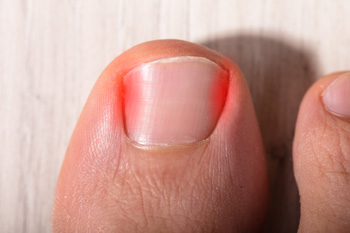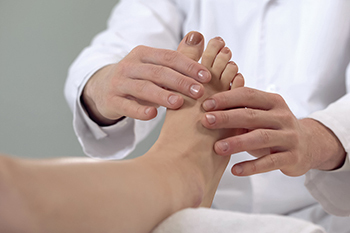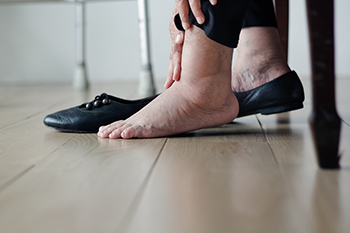September 2022
Infections From Ingrown Toenails

If an individual has an ingrown toenail, the side of one of their toenails has essentially grown into the skin. This can occur as a result of cutting the toenails too short or irregularly, which encourages the skin to grow over top of the nail. Importantly, ingrown toenails can become infected if they are never addressed or treated. Infections of this kind can make a person experience swelling, bleeding, a foul smell, or pain. Infections from ingrown toenails are usually either fungal or bacterial infections. If you have an ingrown toenail and believe that it has developed an infection, contact a podiatrist. This foot specialist will be able to help you identify the problem and come up with a plan to address it.
Ingrown toenails can become painful if they are not treated properly. For more information about ingrown toenails, contact Brian D. Jackson, DPM of Neuhaus Foot and Ankle. Our doctor can provide the care you need to keep you pain-free and on your feet.
Ingrown Toenails
Ingrown toenails occur when a toenail grows sideways into the bed of the nail, causing pain, swelling, and possibly infection.
Causes
- Bacterial infections
- Improper nail cutting such as cutting it too short or not straight across
- Trauma to the toe, such as stubbing, which causes the nail to grow back irregularly
- Ill-fitting shoes that bunch the toes too close together
- Genetic predisposition
Prevention
Because ingrown toenails are not something found outside of shoe-wearing cultures, going barefoot as often as possible will decrease the likeliness of developing ingrown toenails. Wearing proper fitting shoes and using proper cutting techniques will also help decrease your risk of developing ingrown toenails.
Treatment
Ingrown toenails are a very treatable foot condition. In minor cases, soaking the affected area in salt or antibacterial soaps will not only help with the ingrown nail itself, but also help prevent any infections from occurring. In more severe cases, surgery is an option. In either case, speaking to your podiatrist about this condition will help you get a better understanding of specific treatment options that are right for you.
If you have any questions please feel free to contact one of our offices located in Columbia and Pulaski, TN . We offer the newest diagnostic and treatment technologies for all your foot and ankle needs.
Diabetes and Heel Fissures

Cracked heels, or heel fissures, are cracks or splits in the skin on the soles of the feet, often going through to the inner layers of skin. They can be painful when pressure is applied to the skin while standing, and they can bleed. This condition generally comes from dry skin. Loss of nerve supply to the sweat glands in the feet can happen to diabetics, because they tend to have drier skin than others. Heel fissures are common in the general population, but those with diabetes can have more serious consequences if they do not deal with cracked heels effectively. Diabetics can also suffer from neuropathy, causing loss of feeling in the feet. With the loss of sensation, patients with diabetes can have fissures that bleed and can possibly become infected and ulcerated without knowing it. If you are a diabetic, make sure to visually inspect your feet regularly. If you have cracked heels or some other foot problem, it is important for you to see a podiatrist for prompt treatment.
Diabetic foot care is important in preventing foot ailments such as ulcers. If you are suffering from diabetes or have any other concerns about your feet, contact Brian D. Jackson, DPM from Neuhaus Foot and Ankle. Our doctor can provide the care you need to keep you pain-free and on your feet.
Diabetic Foot Care
Diabetes affects millions of people every year. The condition can damage blood vessels in many parts of the body, especially the feet. Because of this, taking care of your feet is essential if you have diabetes, and having a podiatrist help monitor your foot health is highly recommended.
The Importance of Caring for Your Feet
- Routinely inspect your feet for bruises or sores.
- Wear socks that fit your feet comfortably.
- Wear comfortable shoes that provide adequate support.
Patients with diabetes should have their doctor monitor their blood levels, as blood sugar levels play such a huge role in diabetic care. Monitoring these levels on a regular basis is highly advised.
It is always best to inform your healthcare professional of any concerns you may have regarding your feet, especially for diabetic patients. Early treatment and routine foot examinations are keys to maintaining proper health, especially because severe complications can arise if proper treatment is not applied.
If you have any questions please feel free to contact one of our offices located in Columbia and Pulaski, TN . We offer the newest diagnostic and treatment technologies for all your foot and ankle needs.
Swollen Feet and Salt

Swollen feet occur when your feet increase in size due to a concentration of fluids in the feet. It can also commonly impact the ankles. There are many different causes of swollen feet. For example, pregnancy, injuries, insect bites, and infections are just some of the many potential causes of swollen feet. However, one cause of swollen feet that is sometimes overlooked is high salt intake. A diet that is high in salt facilitates the retention of water in the body, which can ultimately cause swollen feet. To prevent this from occurring, an individual might consider adjusting their diet. Not only can one reduce their salt intake by not using salt shakers, but avoiding packaged/processed foods that are high in salt can also be helpful. Salt can be frequently found in these packaged foods as a kind of preservative. You might also consider reducing the number of processed meats that you consume, as some of these meats are high in salt as well. Salt substitutes such as potassium iodide might also be worth incorporating into your diet to limit salt intake. As with anything, it is always best to consult first with a medical professional. If you have swollen feet and believe that it might be linked to your salt intake, schedule an appointment with a podiatrist today.
Swollen feet can be a sign of an underlying condition. If you have any concerns, contact Brian D. Jackson, DPM of Neuhaus Foot and Ankle. Our doctor can provide the care you need to keep you pain-free and on your feet.
Swollen feet are a common ailment among pregnant women and people who stand or sit for extended periods. Aging may increase the possibility of swollen feet and patients who are obese often notice when their feet are swelling too. There may be medical reasons why swollen feet occur:
- Phlebitis - A condition that causes the veins to become inflamed and can also cause leg pain.
- Liver disease - This may lead to low blood levels of albumin which is a protein. This can cause fluid in the blood to pass into the tissues and several areas of the body can become swollen.
- Heart failure - When the heart doesn’t pump properly the blood that is normally pumped back to the heart can pool in the veins of the legs causing swollen feet.
- Kidney disease - One of the main functions of the kidneys is releasing excess fluid in the body. This type of condition can make it difficult for the kidneys to function properly, and as a result the feet may become swollen.
- Deep-vein thrombosis (DVT)- This is a serious condition where blood clots form in the veins of the legs. They can block the return of blood from the legs to the heart which may cause the feet to swell. It is important to be treated by a podiatrist if this condition is present.
Swollen feet can also be caused by bone and tendon conditions, including fractures, arthritis, and tendinitis. Additionally, there may be skin and toenail conditions and an infection may cause the feet to swell. Patients who take medicine to treat high blood pressure may be prone to getting swollen feet.
Many patients elevate their feet to help relieve the swelling and this is generally a temporary remedy. When a podiatrist is consulted the reason behind the swelling can be uncovered and subsequently treated.
If you have any questions please feel free to contact one of our offices located in Columbia and Pulaski, TN . We offer the newest diagnostic tools and technology to treat your foot and ankle needs.
Gout Pain Can Be Managed
Differences Between Running and Walking Shoes

Running shoes and walking shoes have different purposes and, therefore, are built differently. Running shoes are lighter in weight in order to facilitate speed and feel light on the feet. They also have a stiffer sole, a thicker heel for support and cushioning, and motion control features built in to reduce pronation and unbridled foot motions. Walking shoes provide arch support. They are generally heavier and offer more cushioning, however, heels should not be as thick as running shoes and soles should be more flexible and bendable. A podiatrist can offer additional advice on specific features you should look for in either a running or walking shoe, based on your individual feet, your gait or running stride, and to help address any biomechanical, structural, or alignment issues you may have.
For more information about walking shoes versus running shoes, consult with Brian D. Jackson, DPM from Neuhaus Foot and Ankle. Our doctor can measure your feet to determine what your needs are and help you find an appropriate pair of footwear.
Foot Health: The Differences between Walking & Running Shoes
There are great ways to stay in shape: running and walking are two great exercises to a healthy lifestyle. It is important to know that running shoes and walking shoes are not interchangeable. There is a key difference on how the feet hit the ground when someone is running or walking. This is why one should be aware that a shoe is designed differently for each activity.
You may be asking yourself what the real differences are between walking and running shoes and the answers may shock you.
Differences
Walking doesn’t involve as much stress or impact on the feet as running does. However, this doesn’t mean that you should be any less prepared. When you’re walking, you land on your heels and have your foot roll forward. This rolling motion requires additional support to the feet.
Flexibility – Walking shoes are designed to have soft, flexible soles. This allows the walker to push off easily with each step.
If you have any questions, please feel free to contact one of our offices located in Columbia and Pulaski, TN . We offer the newest diagnostic and treatment technologies for all your foot care needs.








